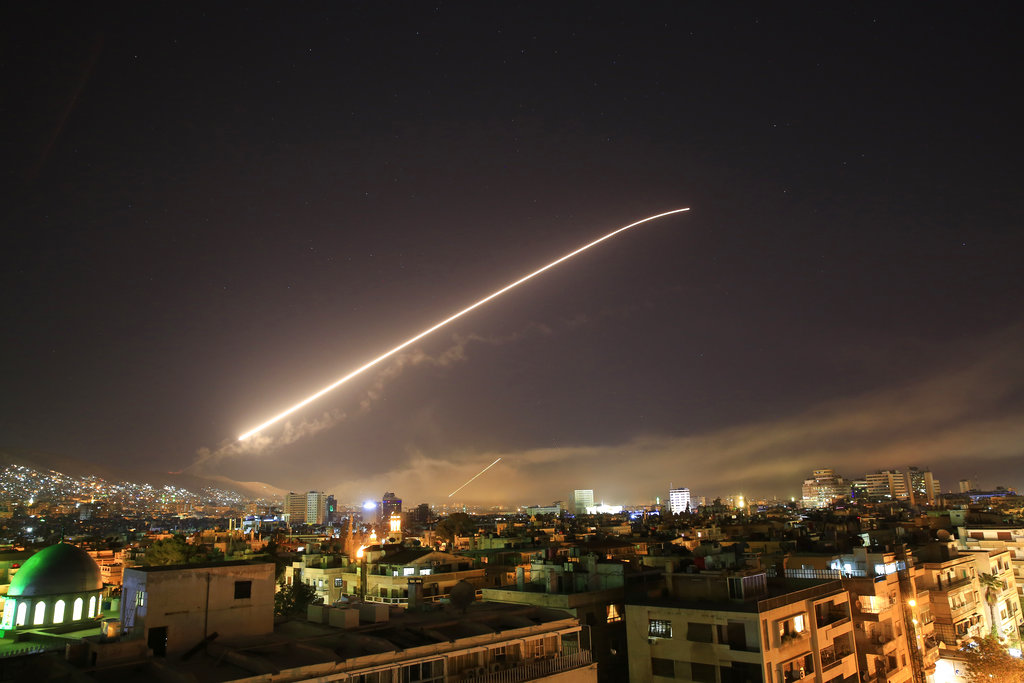Russia loses in vote to criticize US leaving missile treaty

The Damascus sky lights up missile fire as the U.S. launches an attack on Syria targeting different parts of the capital on April 14, 2018. (AP)
UNITED NATIONS — Russia lost a vote Friday that would have allowed the U.N. General Assembly to consider a resolution supporting a landmark missile treaty and opposing U.S. President Donald Trump’s decision to withdraw from it.
The vote to put a Russian resolution backing the Intermediate-Range Nuclear Forces Treaty on the agenda of the Assembly’s disarmament committee was 31 countries in favor, 55 against and 54 abstaining.
Senior Russian arms control official Andrei Belousov said he didn’t understand the result, noting that most countries that abstained “are active supporters of nuclear disarmament” and a significant number of those who voted against the procedural measure are in favor of preserving the INF treaty.
Russia “tried to send a serious signal to U.S. political circles about the danger of the course chosen by the current (U.S.) administration,” he said. “We thought that such an initiative would be supported by all sensible forces.”
Robert Wood, the U.S. ambassador to the Conference on Disarmament, called the Russian proposal a “very politicized resolution” that was not submitted by the deadline to be considered by the disarmament committee.
Article continues after this advertisementRussia presented the draft to the Assembly’s disarmament committee Thursday but the U.S. protested that it was after the Oct. 18 deadline for submitting resolutions. Russia argued that Trump’s announcement came after the deadline, Russian Mission spokesman Fedor Strzhizhovskiy said.
Article continues after this advertisementHe said the committee chair reported Friday that he was unable to find consensus on a way forward and Russia then called for a vote.
A U.N. diplomat, speaking on condition of anonymity because consultations were private, said European Union and NATO countries voted against having the disarmament committee consider the resolution and asked others to abstain in order to prevent further escalation, and promote U.S.-Russian negotiations to find a solution.
The United States accuses Russia of violating the 1987 INF treaty, which eliminates all ground-launched cruise and ballistic missiles with a range of 500-5,500 kilometers (300-3,400 miles).
In 2017, White House national security officials said Russia had deployed a cruise missile in violation of the treaty. Earlier, the Obama administration accused the Russians of violating the pact by developing and testing a prohibited cruise missile.
Russia has repeatedly denied that it has violated the treaty and has accused the United States of not being in compliance.
Wood repeated the U.S. accusations on Friday, telling the disarmament committee after the vote that for 5 1/2 years the United States has tried to engage Russia on the issue of treaty violations. He said Moscow only recently admitted producing a ground-launched missile but maintained it didn’t violate the range limits.
“We presented them with information to the contrary, but they continued to deny being in noncompliance with the treaty,” Wood said. “But instead of responding to our engagement, we received denials and ridiculous accusations that it is the U.S. that is violating the treaty.”
Belousov, the deputy director of the Foreign Ministry’s Department of Nonproliferation and Arms Control, countered that “we have been making complaints about this since 2000” to the United States but “they run from us.”
He said that at a recent meeting the U.S. declared that Russia was preparing for war.
“Yes, Russia is preparing for a war. I confirm it. Yes, we are preparing to defend our homeland, our territorial integrity, our principles, our people,” Belousov said. “The Russian Federations is preparing for war, and the United States of America is preparing for a war. … That is the fact.”
He said the disarmament committee missed an opportunity, but Russia will work with countries supporting its position to convince the United States “to take a constructive position, continue the dialogue” within the INF framework “and refrain from building up its nuclear potential.”
Belousov said Russia will go directly to the General Assembly and, possibly, if there is “a negative development of events and the U.S. withdrawal from the treaty, to the Security Council” where both Russia and the U.S. have veto power on resolutions.